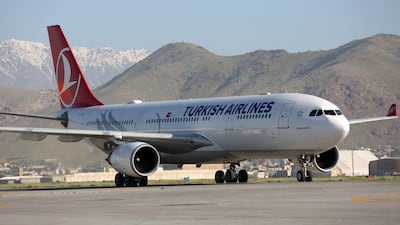Turkish Airlines is continuing talks with Boeing for 150 of its 737 Max narrow-body planes and 75 of its 787 wide-body aircraft, but the final outcome depends on negotiations about engine prices, its chairman said.
“We could even announce the Boeing order earlier but … on the 737 Max there is only one engine [option], the CFM engine, therefore the Max decision depends on the CFM prices and therefore it will take longer,” Ahmet Bolat, chairman of Turkish Airlines, said on Tuesday.
Turkish Airlines has submitted a counter offer to CFM, a joint venture between GE and France's Safran, and is awaiting their response.
Turkish Airlines
“We made our counter-proposals and now we're waiting for them to come to our terms and we will be somewhere in the middle, so how soon [a decision is made] depends on how soon the engine providers and Boeing are planning to end these discussions. Now it's in their hands.”
Airbus remains in the running for a potential order because the airline wants to mitigate the risks of production problems at either aircraft manufacturer by using the products of both companies, Mr Bolat told reporters on the sidelines of the International Air Transport Association (Iata)'s annual meeting in Dubai.
“This could go to Airbus, it doesn't have to be Boeing because the products are similar,” he said.
“We want to mitigate the risks, reduce the risks, by using both products available in the market.”
Turkish Airways aims to nearly double its fleet size to 810 jets in 10 years, from 455 currently, as it seeks to cement its position as a global aviation powerhouse. The airline carried 83 million passengers and earned a profit of nearly $3 billion in 2023.
The jet order discussions come as Boeing is struggling with a series of crises related to safety and quality issues. The US plane maker is under intense regulatory scrutiny after a near-disastrous blowout of a fuselage panel on a 737 Max 9 during flight in January.
“They are a big company and they will solve their problems for sure … Boeing is taking strong steps, strong measures,” he said.
Mr Bolat said he is confident that Stephanie Pope, Boeing's chief operating officer, will handle the situation and increase production levels.
“I am confident that she knows what to do,” he said, noting that he met Ms Pope during the Iata gathering in Dubai.
Turkish Airlines had placed an order with European plane maker Airbus in December for 355 aircraft to secure the much-coveted and fast-filling slots.
“With Airbus, should we exercise our options or not, that's the question, but it will happen maybe after three or four years,” he said.
At present, Turkish Airlines has grounded 20 of its Airbus narrow-bodies due to problems on the Pratt & Whitney engine.
“The problem is not getting worse, the problem is somehow confined,” Mr Bolat said.
“We asked the producer to compensate our losses, so therefore according to the contract of course, they are obligated to do that,” he said.
Supply chain problems with the Pratt & Whitney engine will be solved in two years, he added.


